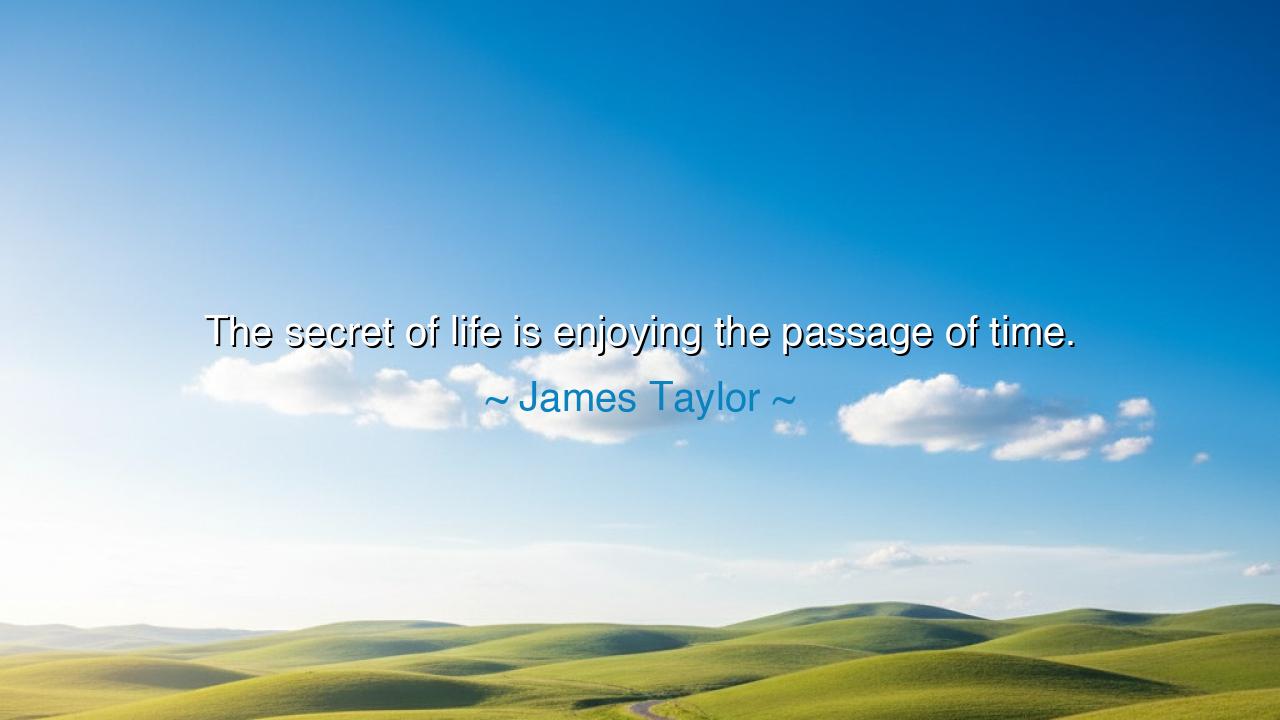
The secret of life is enjoying the passage of time.






The words of James Taylor — "The secret of life is enjoying the passage of time." — fall upon the heart like a gentle song, yet within their simplicity lies profound wisdom. For all men and women wrestle with the mystery of existence, asking what gives life its meaning. Some seek wealth, others power, others glory. Yet Taylor reminds us that the true secret of life is not found in conquest or possession, but in the quiet art of learning to delight in each moment as it flows. Time moves ever forward, indifferent to our grasping, yet to those who learn to enjoy its passage, life reveals itself as rich beyond measure.
The origin of this thought comes from Taylor’s own life, a man who knew both success and suffering. As a singer and poet, he experienced fame and hardship, joy and despair. Out of this mixture, he discovered a truth that echoes the wisdom of the ancients: happiness is not at the end of some distant road, but is found along the way. It is not in the distant summit, but in the journey itself. To enjoy the passage of time is to be free from the endless hunger that devours so many lives.
History gives us many examples of those who lived this truth. Consider Marcus Aurelius, emperor of Rome and philosopher of the Stoics. In the midst of battles, plagues, and the burdens of rule, he wrote in his Meditations that the present moment is all a man can truly possess. He urged himself to be content with each breath, each duty, each hour, knowing that life is nothing but a succession of passing instants. In learning to savor the present, he discovered peace even upon a throne heavy with responsibility. His wisdom reflects the very essence of Taylor’s words.
Or recall the journey of Mahatma Gandhi, who did not chase luxury or riches but found joy in the rhythm of simplicity. He spun his own cloth, walked among his people, and embraced the quiet labor of daily living. His greatness did not come only from his victories over empire, but from his capacity to enjoy the passage of time with humility and gratitude. Even in the midst of struggle, he lived fully in the moments given to him, and in so doing inspired millions.
The teaching is heroic in its gentleness: the river of time cannot be stopped, but it can be cherished. Many waste their days by clinging to the past or fearing the future, yet life is only ever lived in the present flow. To complain against time is to fight the tide; to rejoice in its movement is to learn the secret of life. When we begin to see each hour as a gift, even sorrow is softened, for we realize it too will pass, and joy will return in its season.
The lesson is clear: you must not wait for some distant day to begin living. If you place your hope only in tomorrow, you will never find peace today. Instead, slow yourself to notice the passing moments — the laughter of a friend, the warmth of the sun, the sound of rain upon your window. In these small things lies the greatness of life. By honoring them, you honor the flow of time itself.
What then should you do in practice? Pause daily to give thanks for the present hour. Seek joy not in accumulation, but in awareness. When you work, work with presence; when you rest, rest without guilt. Allow yourself to celebrate even the smallest victories, for each is a marker along your journey. And remember always that no day is wasted if you have learned to enjoy the passage of time within it.
Thus let this teaching endure: life is not a destination but a journey, not a conquest but a song. And the secret of the song is not to rush to its ending, but to savor every note as it is played. Walk, then, with gratitude in your heart, and you will find that time, once feared as fleeting, becomes instead the greatest of companions. For those who enjoy its passage discover the eternal truth — that life itself is already full.






AAdministratorAdministrator
Welcome, honored guests. Please leave a comment, we will respond soon